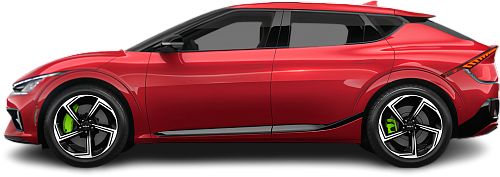BMW i4 M50 vs Kia EV6 GT
Struggling to Decide? Let AI Help!
Your AI Summary Is Ready!
General Info
Since both vehicles have been discontinued, they are now only available on the used car market. You can get the BMW i4 M50 (2021-2024) for as low as €47700, while the Kia EV6 GT (2022-2024) begins at €44900.
The BMW i4 M50 (2021-2024) is a Liftback, whereas the Kia EV6 GT (2022-2024) is a SUV.
| Property | BMW i4 M50 | Kia EV6 GT |
|---|---|---|
| Years of Production | 2021-2024 | 2022-2024 |
| Current Status | Discontinued | Discontinued |
| Country of Manufacture | Germany | South Korea |
| Body Style | Liftback | SUV |
| Market Availability | EU, USA | EU, USA |
| Price Europe (Used) | €47700 | €44900 |
| GCC Score | 6.5 | 6.9 |
Range and Efficiency
The BMW i4 M50 (2021-2024) boasts a greater real-world range, a larger battery, and superior energy efficiency compared to the Kia EV6 GT (2022-2024).
| Property | BMW i4 M50 | Kia EV6 GT |
|---|---|---|
| Range (EPA) | 435 km | 351 km |
| Range (WLTP) | 519 km | 424 km |
| Range (GCC) | 409 km | 347 km |
| Battery Capacity (Nominal) | 83.9 kWh | 77.4 kWh |
| Battery Capacity (Usable) | 80.7 kWh | 74 kWh |
| Efficiency per 100 km | 19.7 kWh/100 km | 21.3 kWh/100 km |
| Efficiency per kWh | 5.07 km/kWh | 4.69 km/kWh |
| Range and Efficiency Score | 6.5 | 5.2 |
Charging
The Kia EV6 GT (2022-2024) features an advanced 800-volt architecture, whereas the BMW i4 M50 (2021-2024) relies on a standard 400-volt system.
The Kia EV6 GT (2022-2024) offers faster charging speeds at DC stations, reaching up to 233 kW, while the BMW i4 M50 (2021-2024) maxes out at 207 kW.
Both vehicles are equipped with the same on-board charger, supporting a maximum AC charging power of 11 kW.
| Property | BMW i4 M50 | Kia EV6 GT |
|---|---|---|
| Max Charging Power (AC) | 11 kW | 11 kW |
| Max Charging Power (DC) | 207 kW | 233 kW |
| Architecture | 400 V | 800 V |
| Charge Port | CCS Type 2 | CCS Type 2 |
| Charging Score | 6.9 | 7.9 |
Performance
Both vehicles are all-wheel drive.
The Kia EV6 GT (2022-2024) boasts greater motor power and accelerates faster from 0 to 100 km/h.
| Property | BMW i4 M50 | Kia EV6 GT |
|---|---|---|
| Drive Type | AWD | AWD |
| Motor Type | PMSM (front), PMSM (rear) | PMSM (front), PMSM (rear) |
| Motor Power (kW) | 400 kW | 430 kW |
| Motor Power (hp) | 536 hp | 577 hp |
| Motor Torque | 795 Nm | 740 Nm |
| 0-100 km/h | 3.9 s | 3.5 s |
| Top Speed | 225 km/h | 260 km/h |
| Performance Score | 6.8 | 7 |
Dimensions
The Kia EV6 GT (2022-2024) is taller, but has a similar length and width to the BMW i4 M50 (2021-2024).
Both models have similar wheelbase lengths.
| Property | BMW i4 M50 | Kia EV6 GT |
|---|---|---|
| Length | 4783 mm | 4695 mm |
| Width (with Mirrors) | 2073 mm | - Width (with Mirrors) |
| Width (w/o Mirrors) | 1852 mm | 1880 mm |
| Height | 1448 mm | 1545 mm |
| Wheelbase | 2856 mm | 2900 mm |
Cargo and Towing
The Kia EV6 GT (2022-2024) features a larger trunk, but the BMW i4 M50 (2021-2024) offers greater maximum cargo capacity when the rear seats are folded.
A frunk (front trunk) is available in the Kia EV6 GT (2022-2024), but the BMW i4 M50 (2021-2024) doesn’t have one.
The Kia EV6 GT (2022-2024) is better suited for heavy loads, offering a greater towing capacity than the BMW i4 M50 (2021-2024).
| Property | BMW i4 M50 | Kia EV6 GT |
|---|---|---|
| Number of Seats | 5 | 5 |
| Curb Weight | 2290 kg | 2125 kg |
| Cargo Volume (Trunk) | 470 l | 480 l |
| Cargo Volume (Max) | 1290 l | 1260 l |
| Cargo Volume (Frunk) | - Cargo Volume (Frunk) | 20 l |
| Towing Capacity | 1600 kg | 1800 kg |
| Cargo and Towing Score | 5 | 6.5 |




